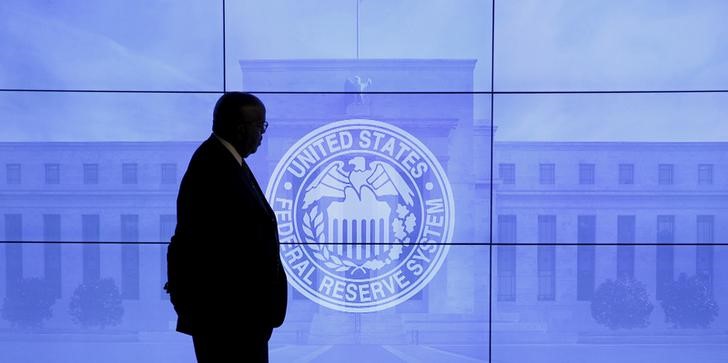By Rahul Karunakar
(Reuters) - The U.S. Federal Reserve will keep interest rates steady at its policy meeting next week but economists held firm to their expectations for a rate hike in June and then another by the end of this year, a Reuters poll showed on Friday.
At its last policy meeting in March, the Fed acknowledged global risks to the U.S economy in justifying a pause and suggested about two more rate hikes are in store this year, only half of what they originally thought in December.
The latest Reuters poll taken this week of more than 80 economists, including almost all of the Wall Street primary dealers, remains roughly in line with that thinking.
Fifty of 80, about two-thirds of the sample, expect the Fed to raise its target federal funds range next in June, to 0.50-0.75 percent. Another 20 percent said September, with the remainder saying either July or December.
One economist said the Fed's next move will be a 25 basis point cut back to 0.00-0.25 percent at year-end and two said rates will remain on hold for the remainder of the year.
No one expected a rate rise at the conclusion of the Federal Open Market Committee's April 26-27 meeting.
Of those who expect rates to rise a second time this year, nearly three-quarters thought the follow-up would be in the fourth quarter, bringing the funds rate to 0.75-1.00 percent.
For a graphic: http://tmsnrt.rs/1XMnDs6
But interest rate futures and bond market traders show less conviction on a series of hikes this year, underscoring an ongoing wide gap between markets and policymakers on the trajectory of rates.
Boston Fed President Eric Rosengren warned again earlier this week that the central bank is likely to raise rates more quickly than futures markets are pricing in.
In the meantime, concerns about the global economy and uneven growth in the U.S. have lingered. [ECILT/US]
Economic growth in the first quarter probably slowed sharply, which has become a pattern in recent years. The latest Reuters poll shows a marked slowdown with forecasts in a wide range.
The Federal Reserve Bank of Atlanta, which does a real-time forecast, said the economy likely stalled in January-March, with just 0.1 percent annualized growth.
"Only if GDP growth fails to pick up in Q2 will the FOMC deliver fewer than two hikes this year," said Philip Marey, a senior U.S. strategist at Rabobank.
"Part of the slowdown in Q1 GDP growth can be attributed to a residual seasonality problem that has not been solved completely."
The U.S. labour market has been the bright spot, and suggests that a long-awaited pick-up in wage inflation may materialise later this year, which might give the Fed more reason to continue raising interest rates.

The number of Americans filing for unemployment benefits unexpectedly fell last week, hitting its lowest level since 1973, suggesting the slowdown in growth in the first quarter might not last.
(Additional reporting and polling by Kailash Bathija, Sarmista Sen and Anu Bararia; Editing by Ross Finley/Jeremy Gaunt)